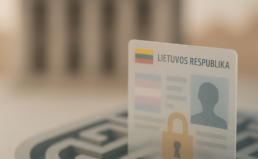The Ukmergė Chamber of Vilnius Regional District Court has issued a ruling suspending the examination of a civil case concerning the amendment of civil status documents indicating gender and referring to the Constitutional Court of the Republic of Lithuania with a request to resolve the compliance of laws applicable in the case with the fundamental legal act of the Republic of Lithuania.
Case Circumstances
The applicant approached the court with a clarified petition requesting: 1) to declare invalid and annul the conclusion issued on April 30, 2025, by the Civil Registration and Document Management Department of Ukmergė District Municipality; 2) to order the correction of the record about the applicant’s gender in civil status documents, changing the record from male to female; 3) to change the records of name and surname in civil status documents so that these records reflect the applicant’s gender identity, and when changing the gender record in the documents, to also change the personal identification code.
The applicant is a transgender woman who, according to civil status records, is registered as a male person, but has long identified as a woman and lives as a woman.
Legal Regulation Gaps
The court established that a situation has developed in the Republic of Lithuania where laws allow a person to change gender and register gender change, but in reality, there are no laws regulating either gender change or the registration of gender change.
Article 2.27, Part 1 of the Civil Code establishes that an unmarried adult has the right to medically change their gender if it is medically possible. Article 2.27, Part 2 of the Civil Code stipulates that the conditions and procedure for gender change are established by laws. However, a law regulating medical gender change has not been adopted to date.
The registration of gender change is not regulated in the Civil Status Acts Registration Law, although Article 2.18, Point 8 of the Civil Code establishes that the state mandatorily registers a civil status act – a person’s gender change.
Article 8, Part 3 of the Population Register Law establishes that the personal identification code assigned to a person is unique and unchangeable, although Article 8, Part 2 of the Population Register Law establishes that the first digit of the personal code corresponds to gender and birth century.
European Court of Human Rights Jurisprudence
The court noted that in its September 11, 2007 judgment in the case L v. Lithuania (petition No. 27527/03), the ECtHR found a violation of Article 8 of the Convention due to a legal regulation gap. The ECtHR stated:
“Lithuanian law recognizes their right to change not only gender but also civil status records. However, a legal gap exists; there is no law regulating gender reassignment operations… found themselves in agonizing uncertainty about their private life and recognition of their true identity.”
In its judgment in the case A.P., Garcon and Nicot v. France (petitions No. 79885/12, 52471/13 and 52596/13), the ECtHR found that requiring a person to undergo irreversible physical changes before changing gender data in birth certificates violates Article 8 of the Convention.
Constitutional Court Jurisprudence
The court relied on the Constitutional Court’s ruling of January 11, 2019, which established that one of the forms of discrimination prohibited under Article 29 of the Constitution is the restriction of human rights due to their gender identity and/or sexual orientation, which is also considered a violation of human dignity.
The Constitutional Court has repeatedly established that the constitutional principle of the rule of law presupposes the requirement for the legislator to establish such legal regulation that would enable subjects of legal relations to know what the law requires of them.
Appeal to the Constitutional Court
The court decided to appeal to the Constitutional Court of the Republic of Lithuania with a request to resolve:
Whether the Civil Status Acts Registration Law of the Republic of Lithuania, insofar as it does not establish the possibility to change data about a person’s gender in civil status records, the grounds, conditions and procedure for changing gender data, contradicts Articles 21, Parts 2 and 3 of the Constitution of the Republic of Lithuania, and the constitutional principle of the rule of law;
Whether Article 8, Part 3 of the Population Register Law of the Republic of Lithuania, insofar as it establishes that the personal identification code is unchangeable, contradicts Articles 21, Parts 2 and 3 of the Constitution of the Republic of Lithuania, and the constitutional principle of the rule of law.
Administrative Gender Recognition Procedure Issue Unresolved for 17 Years
Lithuania has long faced international criticism for failing to implement transgender rights. On March 20, 2024, the Committee of Ministers of the Council of Europe adopted an interim resolution in the context of the L v. Lithuania case, urging Lithuanian authorities to provide a timetable for completing the legislative process. The Committee noted that despite repeated calls from the committee, no progress has been achieved in this area so far.
According to the latest annual Trans Rights Index by the international organization TGEU, Lithuania this year met only 6 out of 32 evaluated criteria: Lithuania has no legal acts prohibiting gender identity recognition; administrative procedures exist for changing personal names in documents; civil status documents can be changed through court proceedings; surgical intervention is not mandatory for changing documents, and forced sterilization requirements are not applied. However, the procedure is only available to unmarried persons, medical diagnosis is still required, and the court procedure itself does not meet the criteria established by Council of Europe Resolution 2048 (2015) standards, which require fast, transparent and accessible administrative procedures based on self-determination, available to all regardless of age or marital status, without mental health diagnosis requirements.
According to 2012 data from the European Union Agency for Fundamental Rights (FRA), 61% of LGBT people in Lithuania said they had been discriminated against or harassed, which was the highest discrimination rate in the EU.
Among the recommendations presented to Lithuania in March 2023 by the UN Committee on Economic, Social and Cultural Rights was a call to ensure effective protection against all forms of discrimination and violence based on sexual orientation and gender identity, which prevents victims from enjoying their economic, social and cultural rights.
This ruling offers a glimmer of hope that the courts might finally break the deadlock where Lithuania’s lawmakers have failed for over 17 years, potentially forcing the country to establish the administrative gender recognition procedures that have remained frustratingly out of reach for transgender citizens.




